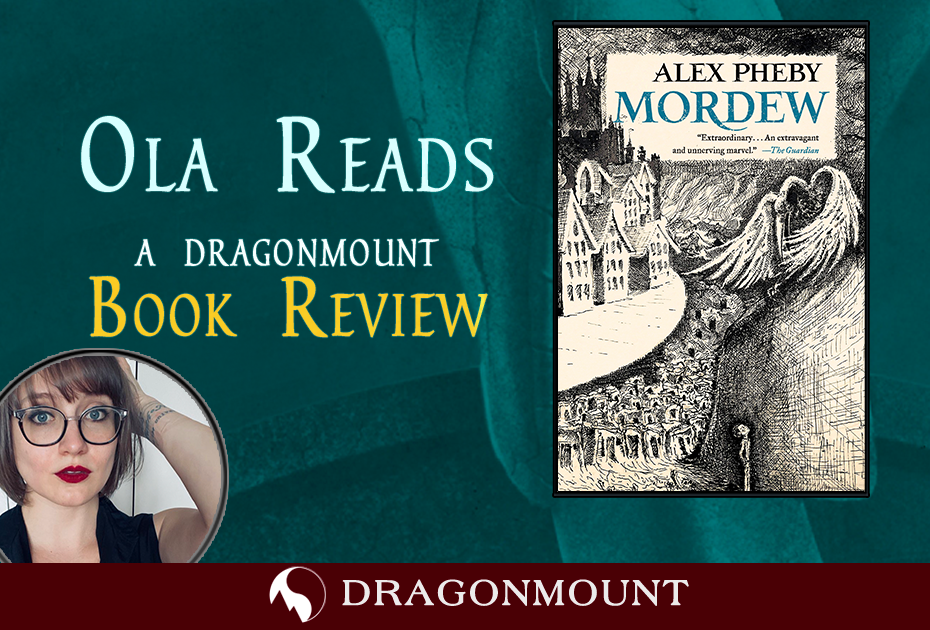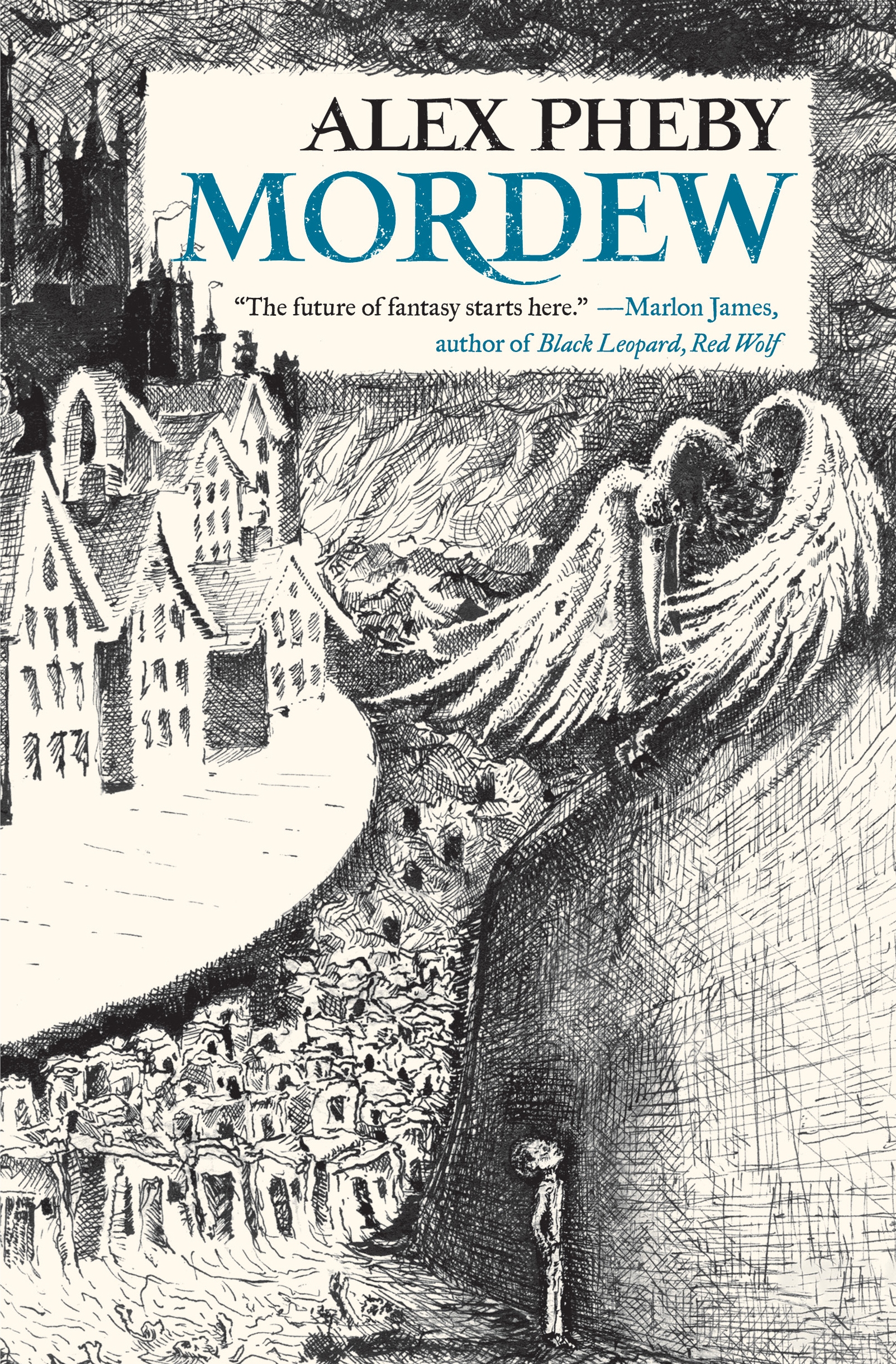
Aleksandra (Ola) Hill is a Polish-Canadian writer and the founder and editor-in-chief of khōréō, a magazine of speculative fiction by immigrant and diaspora writers. She won the grand prize in the 2019 Writer’s Digest Popular Fiction Awards and is currently pursuing an MFA in writing at The New School. You can find her on Twitter at @_aleksandrahill.
#
TL,DR: Mordew by Alex Pheby is a grim, subversive fantasy about a young boy, Nathan, who lives in the slums of the eponymous city and bears a magical Spark. It's a solid read for those who aren't looking for a lighthearted escape, who are comfortable with stories that don't give all the answers and are told at an emotional distance.
#
 Mordew is a hefty first entry of the Cities of the Weft trilogy written by Alex Pheby. It follows Nathan Treeves, a young boy living in Mordew with his mother and very sick father. The world-building is gloriously grimy, reminiscent of the cover itself: all grays and grimness. Living Mud coats the streets of the slums that Nathan calls home; this mud can spontaneously create mutated-looking creatures called dead-life that may or may not remain viable. At the start of the book, we see Nathan wading into the Circus on the west side of Mordew to 'fish' for self-sustaining dead-life: anything he might sell to purchase the medicine his father needs. Nathan can Spark—call up some sort of wild magic from deep within himself—and, in spite of his father's command never to do so, uses this ability to find one such creature. It is "a bundle of infant limbs—arms, legs, hands, feet—a tangle of wriggling living parts" (p.23) made even more horrific by Nathan's cavalier attitude towards it. He sticks it into his bag and trots off to sell it; such abominations are commonplace in this world.
Mordew is a hefty first entry of the Cities of the Weft trilogy written by Alex Pheby. It follows Nathan Treeves, a young boy living in Mordew with his mother and very sick father. The world-building is gloriously grimy, reminiscent of the cover itself: all grays and grimness. Living Mud coats the streets of the slums that Nathan calls home; this mud can spontaneously create mutated-looking creatures called dead-life that may or may not remain viable. At the start of the book, we see Nathan wading into the Circus on the west side of Mordew to 'fish' for self-sustaining dead-life: anything he might sell to purchase the medicine his father needs. Nathan can Spark—call up some sort of wild magic from deep within himself—and, in spite of his father's command never to do so, uses this ability to find one such creature. It is "a bundle of infant limbs—arms, legs, hands, feet—a tangle of wriggling living parts" (p.23) made even more horrific by Nathan's cavalier attitude towards it. He sticks it into his bag and trots off to sell it; such abominations are commonplace in this world.
The services of the medicine woman he purchases with the money from the sale is insufficient. Thus, in order to pay for her husband's medicine, Nathan's mother sends her only son to the mysterious Master who rules over the city in hopes that Nathan will be chosen—for what? Nobody really knows, but needs must: a consistent refrain of Mordew.
A sense of hopelessness runs throughout the story and never truly goes away; this isn't a book—or, presumably, a series—made for happy endings or shiny, escapist magic. Just as Nathan fights constantly for his own survival and that of his father, so too does the Master of Mordew fight a seemingly eternal war against the Mistress of Malarkoi, who sends Firebirds to break the city's walls. There is little room for love or joy in these pages, so if that's something you're looking for, then this isn't the novel for you.
It also isn't for readers who want all the answers. The book begins with a very clear warning: to take care in referencing the glossary, which clocks in at over 100 pages long, as it contains information that the protagonist doesn't know; and that "perhaps the ideal reader of Mordew is one who understands that they, like Nathan Treeves (its hero), are not possessed of all knowledge of all things at all times. They progress through life in a state of imperfect certainty and know that their curiosity will not always be satisfied immediately (if ever)" (p.7).
My memory isn't the best, so I'd forgotten those cautionary words by the time I was a bit into the book. It wasn't until I rediscovered it that I felt like I understood the author's intent. To put it plainly, the reading experience, after the first few pages, feels like one is observing the action through a thick pane of glass. Nathan's feelings are, for the most part, inaccessible, though the reader follows him closely throughout the story. This often felt frustrating, as the character's reactions and motivations were, for the most part, opaque. For example, one character dies in a fall, seemingly pushed by another who had already shown rather suspicious tendencies. Nathan and an accomplice conclude that they have to confront the "pusher" to understand what happened, rather than dismiss them as a traitor. While this might certainly be a reasonable reaction, especially given the child in question is a lonesome one who might be desperate to cling to any semblance of friendship, it felt like it was left up to the reader to ascribe motive and rationale to the actions rather than truly understanding them. The same is true of Prissy, the book's primary love interest: Nathan's devotion to her is clear, but it's hard to understand why it exists and, thus, to truly feel it.
At first, I thought this might be because the author was hesitant to write the inner monologue of an impoverished thirteen-year-old boy—which seems somewhat understandable, given how a combination of desperation and Big Teenage Feelings might be hard to do without veering into the maudlin. But I think, given the introductory warning, it's a more purposeful move on the part of the author. The narrator itself seems to confirm this by not being as close a third person as one might initially expect; at least twice, the book reveals moments that "Nathan saw none of" (p. 380) but that the reader has clearly witnessed. It's unclear who, in fact, is telling us the story—one character is conscripted to help with a task, but "he was sworn to secrecy on the matter, so no more will be said of this." The magic system, too, is tenuous at best, the reader's knowledge of it as patchy as Nathan's. The book is a consistent exercise in incomplete information, whether on the part of the characters or the reader.
Ultimately, this construct doesn't work for me simply because it doesn't give me the emotional investment that I (personally) need as a reader. Being on the outside like this makes it feel like I am seeing the hand of the author too clearly, like he is moving chess pieces around on a board in order to progress the plot in a way that he deems fit. I was drawn to the beginning of the novel, yet felt myself dragging through the vast majority of the rest of it, with the exception of several sections. Indeed, the word that stuck out to me most at the start of the novel was "purpose"; the text questioned what function a machine, or a chain, or some other object performed, often without providing an answer. The author appears intent on subverting the idea of purpose. You can't truly know what function everything in the world has, and thus you can't know what you're doing or what effect it'll have on the future. There's a potential pointlessness to everything our hero does, then, that speaks to an existential ennui. That's not necessarily a bad thing, but it's certainly not for everyone, and it wasn't what I needed or wanted two years into a pandemic. Still, the ending of the book felt immensely satisfying in that I understood, I think, what the author wanted to achieve, and I believe that he achieved it. Teasing apart what in the novel worked for me and what didn't was deeply delightful in and of itself, and even though I don't plan to continue reading the series, I'm glad that I pushed through.
At my most judgmental point of reading, I might have said that this book is one for those insecure about loving genre, who need to prove to themselves or others that fantasy can be 'literary' in the way that any depressing story seems to be when contrasted with a joyful one. But I think that does Mordew a disservice: it is a book for those who realize that, if magic were real, not every story would culminate in a satisfying hero's arc complete with enlightenment. We might begin in hopeless circumstances with no guidance, leaving us to use our adolescent imaginations as best we can to figure out what to do and take our beatings when we get it wrong. It isn't satisfying, per se, but it is an exploration that might provide a sort of pleasure to a certain sort of reader. For those intrigued by such a premise, I recommend Mordew heartily.
Mordew is available in the Dragonmount eBook store. Find it here!











Recommended Comments
Join the conversation
You can post now and register later. If you have an account, sign in now to post with your account.
Note: Your post will require moderator approval before it will be visible.